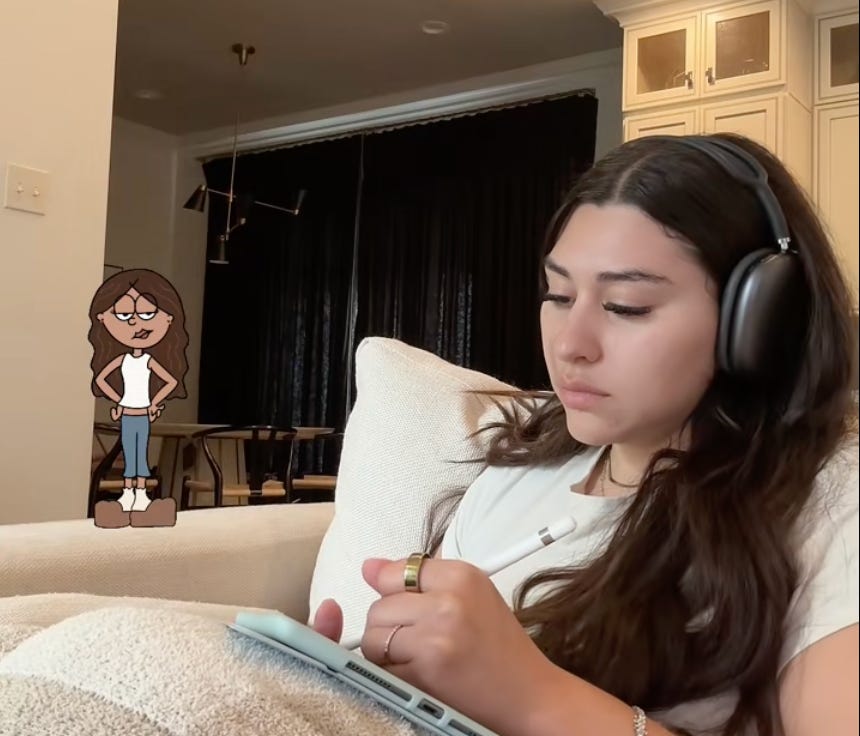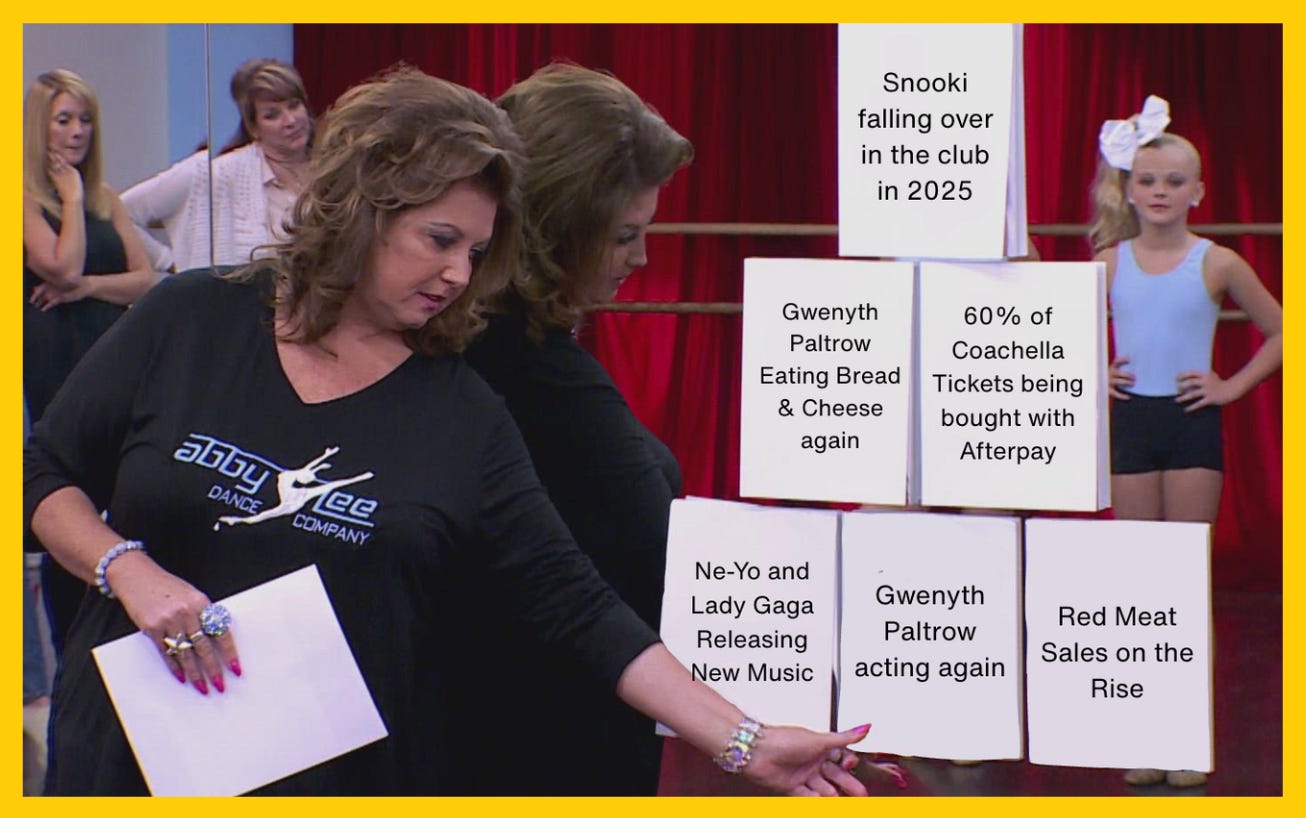May 2025 Trend Report
100 Recession Indicators vs. 1 Gorilla
Welcome to neuewave!
Happy May! We are so glad to have you here to discuss trends for this month.
Finding the underlying threads linking what we see and do online to our social, economic, and cultural lives is fun and incredibly tricky. We're figuring out how the world influences the internet and how it influences things right back. The trends we're about to explore offer a fascinating look at this connection, showing how our online actions mirror and even shape what's happening in the world around us.
On the edge of your seat? Well, before we dive in, we have two major announcements to share:
Add “award-winning” to our bio, because we just won our first two awards as an agency!
neuemotion is thrilled to announce our Webby Award win for Best B2B Social for the "Ask More of AI" campaign with Salesforce, and our Platinum Hermes Creativity Award for our work on Toast's "It's the Little Things" giveaway campaign with Keith Lee! We're incredibly proud to be recognized for our work and grateful for the fantastic clients who made it possible. This is just the beginning!
Our Director of Production, Robin Simon Wood, is speaking at Cannes Lions!
If you are heading to Cannes Lions International Festival of Creativity, be sure to check out neuemotion’s own Robin Simon Wood at her Future Gazers panel!
We can't wait for her to share her thoughts on trends, neuromarketing, and what brands need to know for the future. We may or may not be putting something together around our takeaways from the Cannes Lions International Festival of Creativity next month—stay tuned.
Updates are over! Let’s dive into the trends for May.
🎞️ Main Character Syndrome Goes Cinematic
The more online the world is and the more tangled our social web becomes, the harder it can be to feel like a true individual with a unique lived experience. We see the phrase “I have never had a unique thought in my life” in the comments of every other TikTok video, and as we look online to find community, we also find that it can be exhausting trying to set yourself apart in a digital world.
There are a number ways people have attempted to establish their individuality online, including the development of ‘Main Character Syndrome’: the mindset that your life is a story or a movie where you're the central character (and thus act accordingly).
Main Character Syndrome is connected to the pervasiveness of online comparison culture and the desire to establish individuality in a world where everyone’s life is on display. As opposed to being just another human in the world, Main Character Syndrome allows people to view themselves as the protagonist, romanticizing even the most mundane life experiences.
Many trends have surfaced in the last month that scream ‘Main Character Syndrome’, but with an even more cinematic twist. Through editing and storytelling formats replicating indie-movie montages and fun character intros, content has centered users' life experiences as the main character and idealized the smaller moments that make life truly special. Too bad the Oscars already passed, right?
How This Shows up on Social:
Multiple social formats this month have illustrated this desire to showcase unique and meaningful experiences cinematically.
From the introspective "the butterfly effect is crazy..." trend, showcasing the serendipitous paths leading to significant life moments, to the anticipatory "she/he doesn't know it yet..." format, allowing users to narrate their unfolding futures in the third person, they are all ways for users to assert their individuality and inject a sense of personal narrative into the overwhelming stream of shared online experiences.
Taking this cinematic, character-driven mindset even further, we've seen formats directly replicating cheeky movie intros with deep-voiced narrators and Lizzie McGuire-inspired "minis" offering commentary beginning to pick up steam online. Ultimately, these trends echo the core sentiment of wanting to feel like the main character in one's own life story, especially within the vast landscape of the internet.
💸 Recession Indicators
The word no one can avoid: Recession. Regardless of what side of the political spectrum you’re on, a looming potential recession is surely taking up some kind of space on your timelines, as the fiasco of world politics, tariffs, and economic downturn unfolds. While 72% of Americans are worried about a recession hitting within the next year, leave it to the internet to find the (dark) humor to deal with that possibility.
As a result, the internet is identifying “Recession Indicators”—some real and some unserious—as potential signs or patterns in culture and media that suggest a recession is coming.
How This Shows up on Social:
With over 54 million videos under the trend on TikTok, there is no shortage of examples of what people are claiming to be indicators of an impending recession. The neuemotion team is no stranger to these claims, and so we asked the team: What are some funny recession indicators you think are clear signals of future economic trouble?
We will never shy away from the opportunity to reference an iconic and dramatic reality TV show, so behold our very own "Recession Indicator Pyramid" that would make Abby Lee Miller proud—our take on the recession indicators to watch, unserious or not, ranked from least to most telling. Let us know if you're seeing these out there, too!
Honorable mentions that didn’t make the pyramid: pants under dresses, big celebrities starring in non-luxury commercials, and these shoes being back in store windows.
🌵 Social Capital meets Attainability
Speaking of economic conversation, it seems overt wealth is out; subtle access is in. In today's economy, flashing a ticket to space might earn you more eye rolls than likes, while a rare concert stub elevates your social capital. What changed? The very definition of aspiration.
This shift is indicative of our specific moment in history, where economic uncertainty and the increasing difficulty of achieving traditional milestones of the "American Dream"—homeownership, debt-free living, and raising a family—mean these once-standard aspirations feel out of reach for many.
The backlash directed toward influencers hauling designer furniture to their Coachella campsites, or celebrities heading to space suggests that status is being redefined, particularly for younger generations navigating precarious economic landscapes. Today's status symbols are increasingly found in access to seemingly attainable yet often scarce experiences or items, like Trader Joe's limited-edition tote bags (that people literally brawled for at 8 am) or tickets to highly coveted concerts.
While both covert and overt displays of wealth can feel out of touch, social capital is now acquired through possessing or experiencing things that signal cultural savvy, effort, and insider knowledge, often within a framework of perceived attainability. This reimagines aspiration, where "coolness" lies in having something theoretically accessible to many, rather than something utterly beyond reach, suggesting a recalibration of desire in an era where traditional success metrics feel increasingly elusive.
How This Shows Up on Social
The mindset: It’s cool to have something I could’ve had. It’s not cool to have something I could never fathom having.
While we mentioned concert tickets and TJ’s Tote Bags, there are entire trends displaying what modern social capital looks like in a way that is both attainable and aspirational to large audiences. The first being the “forgot this was the whole point” trend, where people show the moments and things in life that actually matter and add meaning, and the second being the “I’m rich” trend, where people look to other metrics of personal wealth, like seeing a band at their peak, ordering 4 drinks at once, or simply knowing someone who understands your sense of humor as being modern indicators of wealth and aspiration.
🦍 You Had to Be There… and by “There”, we mean “Online”
The internet is never short of outlandish and strange inside jokes that spread like wildfire, and yet would not easily translate when trying to explain to someone in real life. The internet has developed its own secret (and ever-changing) language, constantly evolving with these fleeting, bizarre inside jokes. From Minecraft references to debating the outcome of 100 men vs. 1 gorilla, the conversation continues to deliver strange humor that connects solely with the chronically online.
What makes these trends so fascinating is their inherent inaccessibility to the offline world. Think about trying to explain the concept of the hyper-niche “I’m so hungry, I could eat [insert name here]” to your relative who still calls it “The TikTok”... it feels like a losing battle. And yet, for those who understand the absurdity, it is the peak of comedy during its 15-minute trending window.
The humor often relies on hyper-specific cultural references, a mix of irony and absurdity, and their short lifespans that define a cultural moment. For example, in the case of the “Chicken Jockey” meme that came from the Minecraft movie’s niche reference, it blends a bit of all of the above, capturing a specific humor and audience by referencing a video game in a way that taps into the absurd humor characteristic of TikTok.
How this Shows Up on Social
Internet humor frequently thrives on taking things out of context, exaggerating situations to the extreme, or embracing the nonsensical—evident in the hotly debated, albeit absurd, hypothetical of whether 100 men could defeat a single gorilla, and the niche-reliant "I'm so hungry" trend on social media.
While the team at neuemotion might have differing opinions on the outcome of such a primate-versus-human battle (it’s obviously the gorilla, right?), the enduring fascination with this question highlights that the joy is found in embracing absurdity for its own sake as a source of online entertainment, not in ultimately proving your point to a situation we will likely never test out.
Similarly, the "I'm so hungry" trend cleverly subverts the familiar "eat a horse" hyperbole by replacing it with a surprisingly specific individual in an unsuspecting victim’s life, further demonstrating the internet's penchant for niche and unexpected comedic situations. Ultimately, these examples illustrate how online humor often finds its strength not in logic, but in the shared appreciation of the bizarre and the unexpected.
Those are our trends for May!
These trends tell a compelling story about the intricate and dynamic connection between our online and real-world experiences. What's particularly revealing is the specificity we see emerging across these digital landscapes. Whether it's the detailed narratives of imagined movie-like lives, the pointed humor around specific indicators of a possible recession, or the incredibly niche and often absurd internet jokes that unexpectedly shape our real-world conversations, it all underscores how our online lives not only reflect but actively influence our society, economy, and culture through these distinct and often surprising details, and will endlessly fascinate us here at neuemotion.
Regardless, we are happy to have you on this weird ride with us! Until next time!







